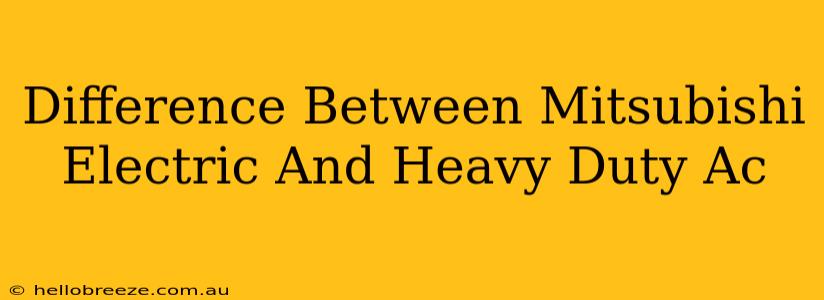Choosing the right air conditioning system for your needs can be overwhelming. This guide clarifies the key distinctions between Mitsubishi Electric air conditioners and heavy-duty AC units, helping you make an informed decision.
What is a Mitsubishi Electric AC?
Mitsubishi Electric is a well-known brand offering a wide range of residential and light commercial air conditioning systems. They are renowned for their:
- High Efficiency: Many Mitsubishi Electric units boast high SEER (Seasonal Energy Efficiency Ratio) ratings, meaning lower energy bills.
- Quiet Operation: Known for their quiet operation, making them ideal for bedrooms and living spaces.
- Zoned Cooling/Heating: Many models offer zoned climate control through multi-zone systems, allowing you to customize temperatures in different areas of your home.
- Stylish Design: Mitsubishi Electric units are often praised for their sleek and modern aesthetics.
- Variety of Models: They offer a range of systems, including ductless mini-splits, duct systems, and more.
These units are suitable for homes, small offices, and other light commercial applications.
What are Heavy-Duty AC Units?
Heavy-duty AC units, also known as industrial or commercial-grade ACs, are designed for demanding applications. They are built to handle:
- High BTU Output: They provide significantly higher cooling capacity (BTU/hr) than residential units, ideal for large spaces like warehouses, factories, or large commercial buildings.
- Harsh Environments: They are engineered to withstand extreme temperatures and demanding operating conditions.
- Continuous Operation: Designed for long periods of continuous operation without significant wear and tear.
- Robust Construction: Heavy-duty ACs are typically constructed with more durable components to withstand the rigors of heavy use.
- Specialized Features: They may include features not found in residential units, such as high-capacity filtration systems or advanced control systems.
These units are not typically suitable for residential use due to their size, power requirements, and cost.
Key Differences Summarized:
| Feature | Mitsubishi Electric AC | Heavy-Duty AC |
|---|---|---|
| Capacity (BTU) | Lower | Much Higher |
| Application | Residential, Light Commercial | Industrial, Heavy Commercial |
| Efficiency | High (for residential/light commercial) | Varies, but often prioritized for durability |
| Noise Level | Typically quieter | Often louder |
| Cost | Generally less expensive | Significantly more expensive |
| Maintenance | Relatively easy | More complex and may require specialized technicians |
Choosing the Right System:
Consider these factors when deciding between a Mitsubishi Electric system and a heavy-duty AC:
- Size of the space: For large spaces, a heavy-duty unit is essential. For homes or smaller businesses, a Mitsubishi Electric system is often sufficient.
- Cooling needs: Heavy-duty units are needed where extremely high cooling capacity is required.
- Budget: Heavy-duty units are a significant investment.
- Environmental conditions: Heavy-duty units are better suited for challenging environments.
Ultimately, the best choice depends on your specific needs and budget. Consult with an HVAC professional to determine the most appropriate system for your application. They can assess your requirements and recommend the most efficient and effective solution. Don't hesitate to ask questions about efficiency, maintenance, and long-term costs before making a decision.

